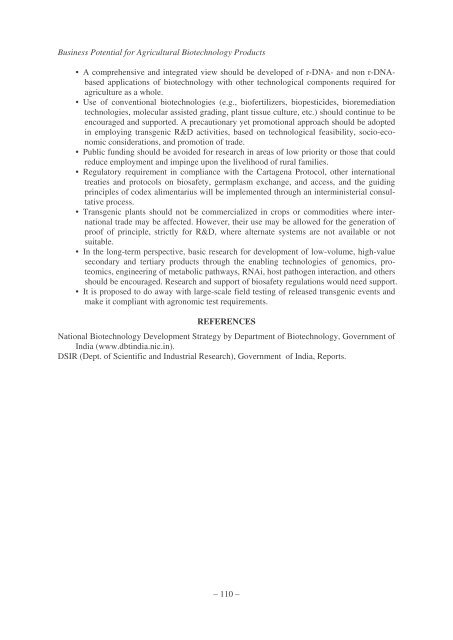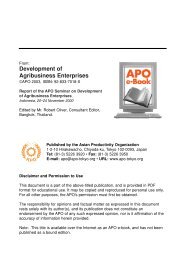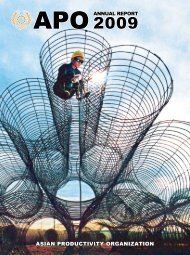Business Potential for Agricultural Biotechnology - Asian Productivity ...
Business Potential for Agricultural Biotechnology - Asian Productivity ...
Business Potential for Agricultural Biotechnology - Asian Productivity ...
You also want an ePaper? Increase the reach of your titles
YUMPU automatically turns print PDFs into web optimized ePapers that Google loves.
<strong>Business</strong> <strong>Potential</strong> <strong>for</strong> <strong>Agricultural</strong> <strong>Biotechnology</strong> Products<br />
• A comprehensive and integrated view should be developed of r-DNA- and non r-DNAbased<br />
applications of biotechnology with other technological components required <strong>for</strong><br />
agriculture as a whole.<br />
• Use of conventional biotechnologies (e.g., biofertilizers, biopesticides, bioremediation<br />
technologies, molecular assisted grading, plant tissue culture, etc.) should continue to be<br />
encouraged and supported. A precautionary yet promotional approach should be adopted<br />
in employing transgenic R&D activities, based on technological feasibility, socio-economic<br />
considerations, and promotion of trade.<br />
• Public funding should be avoided <strong>for</strong> research in areas of low priority or those that could<br />
reduce employment and impinge upon the livelihood of rural families.<br />
• Regulatory requirement in compliance with the Cartagena Protocol, other international<br />
treaties and protocols on biosafety, germplasm exchange, and access, and the guiding<br />
principles of codex alimentarius will be implemented through an interministerial consultative<br />
process.<br />
• Transgenic plants should not be commercialized in crops or commodities where international<br />
trade may be affected. However, their use may be allowed <strong>for</strong> the generation of<br />
proof of principle, strictly <strong>for</strong> R&D, where alternate systems are not available or not<br />
suitable.<br />
• In the long-term perspective, basic research <strong>for</strong> development of low-volume, high-value<br />
secondary and tertiary products through the enabling technologies of genomics, proteomics,<br />
engineering of metabolic pathways, RNAi, host pathogen interaction, and others<br />
should be encouraged. Research and support of biosafety regulations would need support.<br />
• It is proposed to do away with large-scale field testing of released transgenic events and<br />
make it compliant with agronomic test requirements.<br />
REFERENCES<br />
National <strong>Biotechnology</strong> Development Strategy by Department of <strong>Biotechnology</strong>, Government of<br />
India (www.dbtindia.nic.in).<br />
DSIR (Dept. of Scientific and Industrial Research), Government of India, Reports.<br />
– 110 –
















